why are some countries rich and others poor
2021高三英语一轮复习每日一练13 单句改错+阅读理解(含解析)
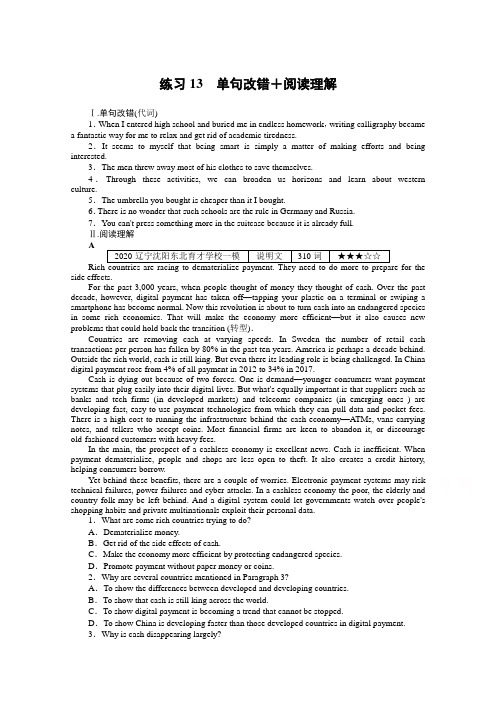
练习13单句改错+阅读理解Ⅰ.单句改错(代词)1.When I entered high school and buried me in endless homework,writing calligraphy became a fantastic way for me to relax and get rid of academic tiredness.________________2.It seems to myself that being smart is simply a matter of making efforts and being interested.________________3.The men threw away most of his clothes to save themselves.________________4.Through these activities, we can broaden us horizons and learn about western culture.________________5.The umbrella you bought is cheaper than it I bought.________________6.There is no wonder that such schools are the rule in Germany and Russia.________________ 7.You can't press something more in the suitcase because it is already full.________________ Ⅱ.阅读理解A2020·辽宁沈阳东北育才学校一模说明文310词★★★☆☆side effects.For the past 3,000 years, when people thought of money they thought of cash. Over the past decade, however, digital payment has taken off—tapping your plastic on a terminal or swiping a smartphone has become normal. Now this revolution is about to turn cash into an endangered species in some rich economies. That will make the economy more efficient—but it also causes new problems that could hold back the transition (转型).Countries are removing cash at varying speeds. In Sweden the number of retail cash transactions per person has fallen by 80% in the past ten years. America is perhaps a decade behind. Outside the rich world, cash is still king. But even there its leading role is being challenged. In China digital payment rose from 4% of all payment in 2012 to 34% in 2017.Cash is dying out because of two forces. One is demand—younger consumers want payment systems that plug easily into their digital lives. But what's equally important is that suppliers such as banks and tech firms (in developed markets) and telecoms companies (in emerging ones ) are developing fast, easy-to-use payment technologies from which they can pull data and pocket fees. There is a high cost to running the infrastructure behind the cash economy—ATMs, vans carrying notes, and tellers who accept coins. Most financial firms are keen to abandon it, or discourage old-fashioned customers with heavy fees.In the main, the prospect of a cashless economy is excellent news. Cash is inefficient. When payment dematerialize, people and shops are less open to theft. It also creates a credit history, helping consumers borrow.Yet behind these benefits, there are a couple of worries. Electronic payment systems may risk technical failures, power failures and cyber attacks. In a cashless economy the poor, the elderly and country folk may be left behind. And a digital system could let governments watch over people's shopping habits and private multinationals exploit their personal data.1.What are some rich countries trying to do?A.Dematerialize money.B.Get rid of the side effects of cash.C.Make the economy more efficient by protecting endangered species.D.Promote payment without paper money or coins.2.Why are several countries mentioned in Paragraph 3?A.To show the differences between developed and developing countries.B.To show that cash is still king across the world.C.To show digital payment is becoming a trend that cannot be stopped.D.To show China is developing faster than those developed countries in digital payment.3.Why is cash disappearing largely?A.Younger consumers are short of money to live their digital lives.B.Suppliers are trying to reduce costs and obtain money and data.C.The infrastructure is developing at high speed in developed markets.D.Financial firms want to abandon old-fashioned customers.4.What's the author's attitude toward digital payment?A.Favorable. B.Negative. C.Objective. D.Indifferent.BMy family graduate of the University of Texas. However, around my second year in law school, I wanted to make a great change, which was almost unheard of for Texans: I wanted to leave!I realized this after completing my first-year internship (实习期). I knew I wanted something different and my chance came during the 2011 Super Bowl in Dallas. A snowstorm blanketed the entire city in snow and thousands of people were gathered. I overheard that StubHub, a big company from a great city, San Francisco, was throwing a party next door to my hotel. I thought if I could get an internship, I could leave for the summer and at least see what it was like. Yes, it was a huge leap. I told myself I was ready.There was just one problem: I wasn't invited to the StubHub's party. But you know I'm the type of person who goes for something she wants. Needless to say, I crashed the party and found my way to the president. I kindly introduced myself and then asked if they had a legal internship program. Guess what? They accepted my request to be a legal intern, even though no such program existed.Although the legal department didn't have a permanent position for me, the experience has shaped my life. Working for a great company in San Francisco, I'm incredibly happy for making my decision to leave Texas.By leaving Texas, I learned that it is so much more rewarding to try the unfamiliar than to stay in the comfortable. Exploring the unfamiliar is how you'll understand what fits your life. I say, dive in head first.5.What happened to the author in Dallas in 2011?A.She was accepted as a legal intern. B.She played in the Super Bowl.C.She escaped from San Francisco. D.She met up with her family.6.Why was the author able to go to San Francisco?A.She introduced herself to the president of StubHub.B.She watched the 2011 Super Bowl in Dallas.C.She dropped out of the University of Texas.D.A snowstorm blanketed the entire city in snow.7.Which is the biggest lesson that the author learned from the experience?A.You must choose a career that you like.B.Jumping out of your comfort zone is rewarding.C.Accepting who you are makes you realize your strengths.D.You should listen to your family to learn about your potential.8.Which of the following words can best describe the author?A.Patient and modest. B.Supportive and energetic.C.Intelligent and humorous. D.Determined and positive.黄金考点练习13单句改错+阅读理解Ⅰ.单句改错(代词)1.答案与解析:第一个me→myself bury oneself in sth.“使自己专心于……”,为固定短语。
不一样的新概念英语第2册 21.1丨[词汇脱口秀]
![不一样的新概念英语第2册 21.1丨[词汇脱口秀]](https://img.taocdn.com/s3/m/284b436dbe1e650e52ea9973.png)
021.1 -【词汇脱口秀】如何讲述生活理念:坚守家园的疯子1. Mad adj.疯1)发疯;go mad / crazy昨天,你发现有人在深更半夜,在房顶上唱歌。
* A man was singing loudly on the roof of his house at mid-night.你断定:这家伙一定是疯了。
This guy must have gone mad/ crazy.或:This guy must have been mad / crazy.由于他的难听的歌声,你一夜没合眼,你会说:The terrible noise of his song drove me mad / crazy last night.go insane歌词:Oceans apart, day after day. And I slowly go insane.我们远隔重洋,日复一日。
思念之情让我渐渐变得失常。
* insanity n.疯狂* Linsanity n.这个词是《华盛顿邮报》给NBA华裔球星林书豪(Jeremy Lin)起的绰号。
林书豪从在NBA选秀会上落榜,到立足NBA联盟,再到2012你年效力纽约尼克斯New York Knicks表现神勇一夕成名,掀起“林风暴”。
他的经历被华裔导演梁伊丹拍成了纪录片Linsanity。
go nuts / bananas发疯,发飙My mom went nuts / bananas when I told her I would quit school.当我告诉妈妈我要退学,妈妈勃然大怒。
go postal (上世纪90年代初美国发生几起邮局员工被辞退后,持枪枪杀邮局同事的事件,go postal去邮局就变成俚语表示,发疯了)To go postal means to become very angry and behave in a violent way. 当他的女朋友甩了他,他简直疯了。
2020年1月18日大陆雅思AB卷大作文解析
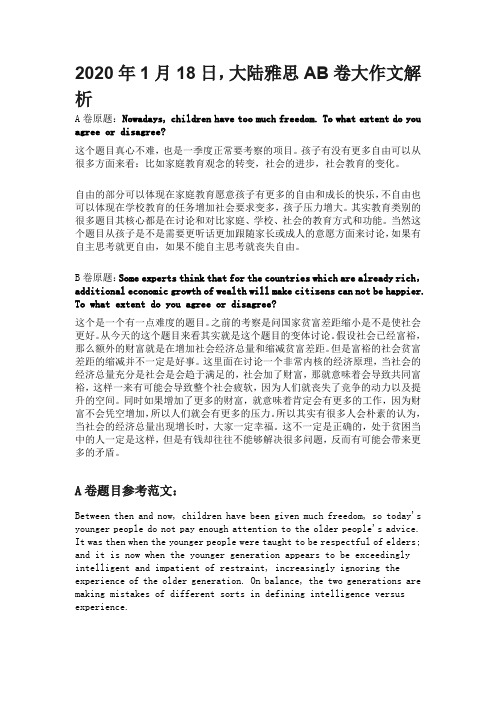
2020年1月18日,大陆雅思AB卷大作文解析A卷原题:Nowadays, children have too much freedom. To what extent do you agree or disagree?这个题目真心不难,也是一季度正常要考察的项目。
孩子有没有更多自由可以从很多方面来看:比如家庭教育观念的转变,社会的进步,社会教育的变化。
自由的部分可以体现在家庭教育愿意孩子有更多的自由和成长的快乐,不自由也可以体现在学校教育的任务增加社会要求变多,孩子压力增大。
其实教育类别的很多题目其核心都是在讨论和对比家庭、学校、社会的教育方式和功能。
当然这个题目从孩子是不是需要更听话更加跟随家长或成人的意愿方面来讨论,如果有自主思考就更自由,如果不能自主思考就丧失自由。
B卷原题:Some experts think that for the countries which are already rich,additional economic growth of wealth will make citizens can not be happier. To what extent do you agree or disagree?这个是一个有一点难度的题目。
之前的考察是问国家贫富差距缩小是不是使社会更好。
从今天的这个题目来看其实就是这个题目的变体讨论。
假设社会已经富裕,那么额外的财富就是在增加社会经济总量和缩减贫富差距。
但是富裕的社会贫富差距的缩减并不一定是好事。
这里面在讨论一个非常内核的经济原理,当社会的经济总量充分是社会是会趋于满足的,社会加了财富,那就意味着会导致共同富裕,这样一来有可能会导致整个社会疲软,因为人们就丧失了竞争的动力以及提升的空间。
同时如果增加了更多的财富,就意味着肯定会有更多的工作,因为财富不会凭空增加,所以人们就会有更多的压力。
所以其实有很多人会朴素的认为,当社会的经济总量出现增长时,大家一定幸福。
新教材高中英语Unit2OnwardsandupwardsPeriod2课时素养检测(含解析)选择性

Unit 2 Onwards and upwards课时素养检测六Unit 2 Period 2Ⅰ. 阅读理解A(2020·攀枝花高二检测) Recently, a scientist did some experiments. He left a group of 4yearolds in a room with a bell and a candy. If they rang the bell, he would e back and they could eat the candy. If, however, they didn’t ring the bell and waited for him to e back on his own, they could then have two candies.In the videos of the experiments, he can see the children hiding their eyes, trying to exercise selfcontrol so they can wait and get two candies. The results are different. Some broke down and rang the bell within a minute. Others lasted 15 minutes.The children who waited longer went on to get higher academic scores. They got into better colleges and had better adult success. The children who rang the bell quickest were more likely to have received worse teacher and parental evaluations (评价) 10 years later and were more likely to have drug problems at age 32.The experiments are worth noting because people spend a lot of time thinking about how to improve education, and how to bee rich. But when the result is not good, they will e back to ask “how do we get people to get the sort of selfcontrol that leads to success?” This is to enter the world of human nature.So these experiments, along with everyday experience, tell us that selfcontrol is most important. Young people who can sit through sometimes boring classes to get a degree can work hard in order to learn a language well. They can avoid drugs and alcohol. For people without selfcontrol skills, however, school is a series of failed and painful experience. No wonder they drop out and their later life is a group of foolish ideas, such as drug use, stealing and so on.【语篇概述】本文属于说明文,讲述了自控力和未来成功的关系,实验表明自控力强的人以后成功的机会更大。
人教版高中英语选择性必修第四册精品课件 Unit 4 SHARING Section C

Task 2 Reading for the main idea 1.What’s the main idea of the passage?
It is worthwhile to help others as a volunteer.
2.Read the text again and match each paragraph with its main idea.
B.Many dangerous diseases are rare in Tanzania.
C.The country is quite beautiful and many of the people are quite rich.
D.Some Tanzanians with a heart condition even died without medical
【掌握构词规律 快速记牢单词】 后缀-ion 常用于字母t结尾的动词之后构成名词,如: infect→infection 感染 select→selection 挑选 elect→election 选举 collect→collection 收集
Ⅱ.重点短语
1. take for granted
Step Two While-reading Task 1 Skimming for the main structure
1.worthwhile 2.volunteered 3.bonds 4.left 5.terrible 6.changed 7.what 8.responsible 9.volunteer 10.pray
2. contract
vt.感染(疾病);与……订立合同(或契约) n.合同;契约
3. relay
江苏省盐城市大丰区2024-2025学年九年级上学期9月月考英语试题
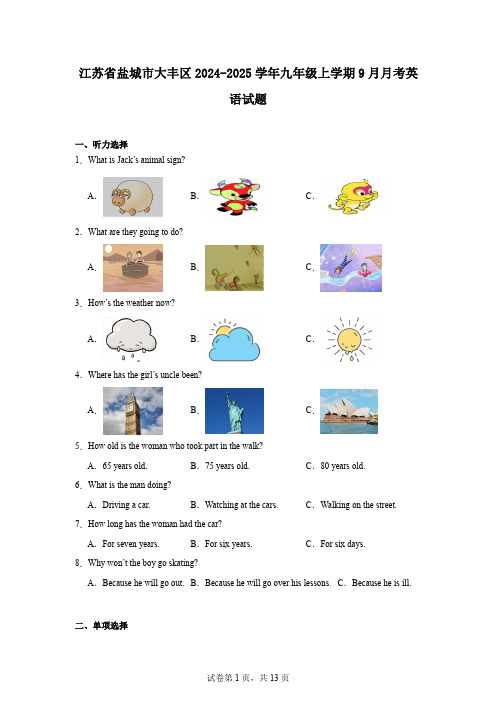
江苏省盐城市大丰区2024-2025学年九年级上学期9月月考英语试题一、听力选择1.What is Jack’s animal sign?A.B.C.2.What are they going to do?A.B.C.3.How’s the weather now?A.B.C.4.Where has the girl’s uncle been?A.B.C.5.How old is the woman who took part in the walk?A.65 years old.B.75 years old.C.80 years old.6.What is the man doing?A.Driving a car.B.Watching at the cars.C.Walking on the street. 7.How long has the woman had the car?A.For seven years.B.For six years.C.For six days.8.Why won’t the boy go skating?A.Because he will go out.B.Because he will go over his lessons.C.Because he is ill.二、单项选择9.How much did the woman pay for the ticket?A.1,120 yuan.B.790 yuan.C.680 yuan.三、听力选择10.Who bought the bike for the boy?A.Dick himself.B.Kate’s aunt.C.Dick’s aunt.听一段对话,回答以下小题。
11.What activity does the man’s wife probably like best?A.Reading.B.Fishing.C.Climbing mountains. 12.When will the woman visit Europe?A.Not mentioned. (未提及)B.Next summer.C.This summer.听短文,回答小题。
中国文化和日本文化的差异英文作文
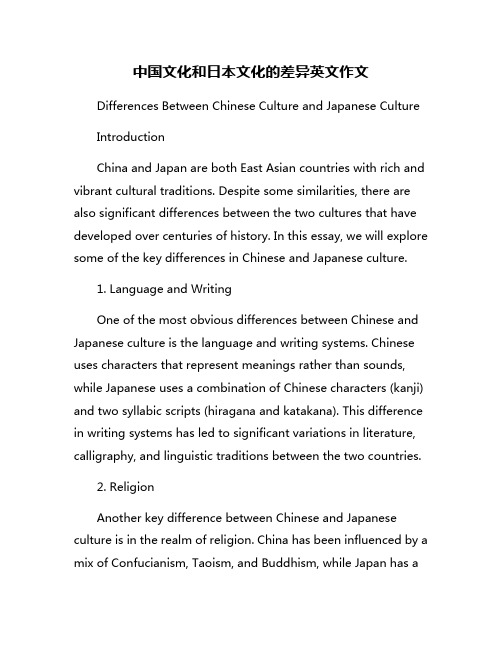
中国文化和日本文化的差异英文作文Differences Between Chinese Culture and Japanese CultureIntroductionChina and Japan are both East Asian countries with rich and vibrant cultural traditions. Despite some similarities, there are also significant differences between the two cultures that have developed over centuries of history. In this essay, we will explore some of the key differences in Chinese and Japanese culture.1. Language and WritingOne of the most obvious differences between Chinese and Japanese culture is the language and writing systems. Chinese uses characters that represent meanings rather than sounds, while Japanese uses a combination of Chinese characters (kanji) and two syllabic scripts (hiragana and katakana). This difference in writing systems has led to significant variations in literature, calligraphy, and linguistic traditions between the two countries.2. ReligionAnother key difference between Chinese and Japanese culture is in the realm of religion. China has been influenced by a mix of Confucianism, Taoism, and Buddhism, while Japan has astrong tradition of Shintoism as well as Buddhism. These religious beliefs have shaped various aspects of culture, including art, architecture, festivals, and rituals.3. Art and AestheticsChinese and Japanese art have distinct styles and themes. Chinese art often features bold colors and brush strokes, focusing on natural landscapes, calligraphy, and traditional Chinese motifs. Japanese art, on the other hand, tends to showcase subtle and delicate patterns, with an emphasis on simplicity, harmony, and attention to detail.4. CuisineChinese and Japanese cuisine are both renowned for their diverse and flavorful dishes, but there are notable differences in ingredients, flavors, and cooking techniques. Chinese food often includes bold and spicy flavors, while Japanese cuisine emphasizes fresh, seasonal ingredients and meticulous presentation. Popular dishes like dim sum and Peking duck are distinctly Chinese, while sushi and tempura are well-known Japanese delicacies.5. Social CustomsSocial customs and etiquette vary between Chinese and Japanese culture. In China, hierarchical relationships are important, and respect for elders and authority figures is emphasized. In Japan, there is a strong emphasis on politeness, etiquette, and harmony in interpersonal interactions. Bowing is a common greeting in Japan, while handshakes are more common in China.6. Fashion and Traditional AttireChinese and Japanese traditional clothing reflects the history and values of each culture. Chinese traditional attire includes the qipao and cheongsam, featuring vibrant colors and intricate embroidery. Japanese traditional clothing like the kimono and yukata are known for their simple and elegant designs, often made from silk or cotton fabrics.ConclusionIn conclusion, Chinese and Japanese culture share some similarities, but there are also significant differences in language, religion, art, cuisine, social customs, and fashion. These cultural distinctions enrich the diversity and heritage of East Asia, reflecting the unique histories, values, and traditions of both countries. By understanding and appreciating these differences,we can foster greater cultural awareness and cross-cultural dialogue between China and Japan.。
安徽大学研究生英语上册12356的课后习题翻译
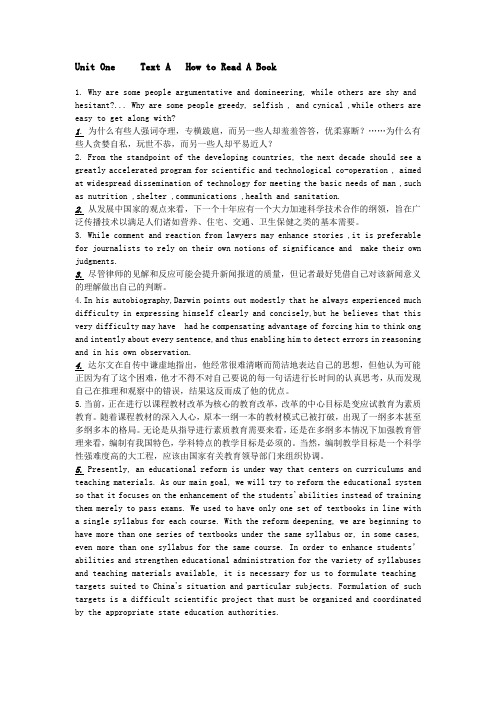
Unit One Text A How to Read A Book1. Why are some people argumentative and domineering, while others are shy and hesitant?... Why are some people greedy, selfish , and cynical ,while others are easy to get along with?1.为什么有些人强词夺理,专横跋扈,而另一些人却羞羞答答,优柔寡断?……为什么有些人贪婪自私,玩世不恭,而另一些人却平易近人?2. From the standpoint of the developing countries, the next decade should see a greatly accelerated program for scientific and technological co-operation , aimed at widespread dissemination of technology for meeting the basic needs of man ,such as nutrition ,shelter ,communications ,health and sanitation.2.从发展中国家的观点来看,下一个十年应有一个大力加速科学技术合作的纲领,旨在广泛传播技术以满足人们诸如营养、住宅、交通、卫生保健之类的基本需要。
3. While comment and reaction from lawyers may enhance stories ,it is preferable for journalists to rely on their own notions of significance and make their own judgments.3.尽管律师的见解和反应可能会提升新闻报道的质量,但记者最好凭借自己对该新闻意义的理解做出自己的判断。
- 1、下载文档前请自行甄别文档内容的完整性,平台不提供额外的编辑、内容补充、找答案等附加服务。
- 2、"仅部分预览"的文档,不可在线预览部分如存在完整性等问题,可反馈申请退款(可完整预览的文档不适用该条件!)。
- 3、如文档侵犯您的权益,请联系客服反馈,我们会尽快为您处理(人工客服工作时间:9:00-18:30)。
MELISSA BLOCK, HOST: Why are some countries rich while others are poor? Adam Davidson of NPR's Planet Money has been talking with economists, who say their colleagues have been looking for an answer in all of the wrong places.
ADAM DA VIDSON, BYLINE:The question: why are some nations rich while others are poor, is the most important question in economics. And after centuries of trying to figure out the answer, economists still don't know. Until, maybe, just maybe - right now.
Two important economists have come out with a new book that they say, and many others agree, may offer the answer. The book is called "Why Nations Fail." One of the authors, Harvard's James Robinson, says the reason economists haven't succeeded so far is that they've been so obsessed with mathematical models of fictional economies that don't actually exist.
JAMES ROBINSON: Economists sort of lock themselves into a straitjacket, you know, in the late 19th century. And one of the things that was out of economics was politics. The more and more I read about problems of development in Africa or Latin America, or wherever it was, politics just seemed so central to understanding what was going on.
DA VIDSON: To those of us who are not economists, this radical idea seems pretty obvious. Yeah, politics of course plays a huge role in why some countries are poor and others aren't. But economists kept looking to things that Robinson and his co-author, MIT's Daron Acemoglu, say are secondary: like the existence or absence of natural resources or how healthy the population is. The two authors became renowned for a series of papers that showed in the clear mathematics that economists like, that politics is not a secondary thing. It is the core driver explaining different levels of wealth.
What Robinson and Acemoglu did is they scoured the world for populations or geographic areas that are very similar. They're similar in almost every respect except for one thing - they are on opposite sides of an arbitrary political border.
Here's Daron Acemoglu.
DARON ACEMOGLU: Korea - so, you know, Korea was an unusually homogeneous country - linguistically, ethnically, culturally, historically. At the 38th Parallel, you have a border drawn and then, you know, the next subsequent 50 years you see the two parts of it diverge to such an extent that today, you know, the income gap between the South and North is over tenfold.
DA VIDSON:The two Koreas may be an extreme example but you can see very similar things on the border of the U.S. and Mexico, in Haiti and the Dominican Republic, and dozens of other neighboring countries. In all of these cases, the people and land are fairly similar but the border changed everything.
ACEMOGLU:It's all about institutions. It's really about human-made systems, rules, regulations - formal or informal - that create different incentives.
DA VIDSON: When these guys talk about institutions they mean the word as broadly as possible. It's the formal rules and laws, but it's also the norms and common practices of a society. Acemoglu and Robinson say the key difference between rich countries and poor ones is the degree to which a country has institutions that keep a small elite from grabbing all the wealth.
Think of a poor farmer in Haiti or the Congo today. Sure, he could, maybe, irrigate his land and till the soil and grow more stuff. But he knows that the institutions in place guarantee that some well-connected member of the elite is going to show up and claim the spoils. So what's the point? The poor have no incentive to invest in land or businesses, or to accumulate savings. The result: Undeveloped land and a poor nation.
ROBINSON: Ultimately what needs to change is that those countries have to make a transition to having inclusive institutions. And that's not something that throwing money at them can achieve. That's a sort of social, political transformation in society.
DA VIDSON:This can seem discouraging but their message does offer hope. Poverty is not the inevitable result of bad geography, bad culture, bad history. It's the result of us: of the ways that people choose to organize their societies. And that means we can change things.
Adam Davidson, NPR News.。
